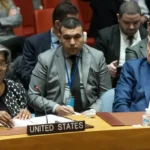For over two million Palestinians in Gaza, education is a symbol of struggle and a target. Schools themselves become destroyed on the ground with Gaza being shelled by Israelis or are being used as makeshift homes by Palestinians. From October 2023 till the present, the Israeli attacks have killed more than 10 thousand Palestinian students, many more have been injured, and education infrastructure has been destroyed.
The term “scholasticism” now sums up the operation of targeting and eradicating Palestinian education, which is the extent of a strategy that seeks to not only wipe out learning spaces but also the very profitable growth of a nation’s mind. As the international school year starts, the future of education of the Palestinian people is in a very precarious situation.
On the one hand, the correlation between education and resistance is not novel to Palestinians. Although I grew up during the Second Intifada, I saw the people’s defiance just in attending school. Previous education was a form of survival and goes back to the days when tanks of Israeli forces were parked at the entry of my primary school in the West Bank.
Today, however, Gaza’s youth face much worse prospects. Most schools, universities, and educational resources have been destroyed and reduced, and Palestinian students find themselves in a problematic environment mainly characterized by survival at the expense of education.
But the object destruction of Gaza’s education system is not merely a matter of careless destruction of ends; it remains a conscious result of the settler-colonial project. This eradication of educational surfaces can be done side by side with efforts to wipe out Palestinians’ identity and history. Achieving this means there has to be the application of ignorance as a tool in this context. Education is denied to Palestinians. Future generations lack the equipped armor to fight, narrate their experiences, or even stand up against oppressors who seek to eliminate them from history.
The numbers are staggering. Gaza Strip has 17 higher education institutions that are either partially or wholly crippled if not entirely demolished. Currently, primary and secondary school students’ rights to attend school are violated, and more than 600000 students cannot participate in school. Many school teachers, university lecturers, researchers, and scholars have been assassinated, and their lights dimmed with them and the knowledge they possessed. Despite the material losses, which include the buildings themselves, the psychological trauma given to the Palestinian youth also acts as a hindrance to their educational process. What is more, the idea of the process of intellectual development is in question.
Still, among the debris of what was destroyed, hope prevails. The universities of Gaza, even though they have been bombed, have pledged to continue with the teaching activities. This is a testimony to the Palestine Sumud, which means the Palestinians stand to survive. During the first Intifada, particularly school closing, people converted homes and other community structures into classrooms. Today, the school bag is an iconic symbol of rebellion worn as a survival bag, and the books are used as symbols of hope in the given environment.
It is not only a war on schooling and classrooms in Palestine, but it is also a war against a future, leadership, and history in Palestine. In this way, the occupation attempts to wipe out the intellectual and educational capital of a nation.
But, as history attests, the Palestinians will rise, regenerate, and recreate themselves, starting from the tender and tent if need be, clinging to the education of the Palestinians as the fundamental factor in the Palestinian’s existence and the Palestinian’s salvation. The world must take note: this is not just an attack on materials, but on a generation, an attack on a race, an attack on a tribe.















